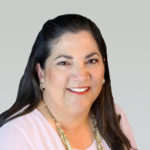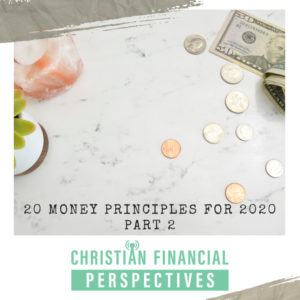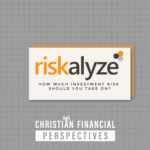Click below to listen to Episode 67 – 20 Money Principles for 2020 Part 2
Subscribe: Apple Podcasts | Google Podcasts | Spotify | Amazon Music | Stitcher | RSS | More
20 Money Principles for 2020 Part 2
This episode ends our 2 part series on “20 Money Principles for 2020” to help you become more financially successful, with an emphasis on what the Bible says about financial issues. Many people don’t realize there are over 2200 scriptures about stewardship and how we handle money in the Bible. As Christians, we can rely on Biblical principles for guidelines to govern and manage our day to day lives.
Biblical guidelines not only help us to live a successful life, but they also illustrate many of the financial principles that are mentioned in this podcast episode (as well as previous episodes of Christian Financial Perspectives). So sit back and listen to numbers 11 through 20 of our money principles covered in part 2.
HOSTED BY: Bob Barber, CWS®, CKA® and Mary Jo Lyons, CFP®, CKA®
Mentioned In This Episode

Mary Jo Lyons, CFP®, CKA®
Want to ask a question about your specific situation? Schedule a complimentary 15 minute phone call.
EPISODE TRANSCRIPT
[INTRODUCTION]
Bob: Welcome to Christian Financial Perspectives, a podcast where we talk about ways to integrate your faith with your finances. This is Bob Barber.
Mary Jo: And I’m Mary Jo Lyons.
Bob: Are you ready to learn how to apply biblical wisdom to everyday financial decisions?
Mary Jo: Join us as we look at integrating your faith with your finances. If it’s your first time listening, welcome to our podcast, and if you’re a returning listener, welcome back.
[EPISODES]
Bob: Proverbs 8:32-35, “And so my children listen to me, for all who follow my ways or joyful. Listen to my instruction and be wise. Don’t ignore it. Joyful are those who listen to me, watching for me daily at my gates, waiting for me outside my home. For whoever finds me finds life and receives favor from the Lord.” What a beautiful scripture.
Mary Jo: It is. You know, who doesn’t want favor?
Bob: I do. I definitely do. Hey, especially when I go to the HEB parking lot where it’s so full.
Mary Jo: You need favor there.
Bob: You do here in New Braunfels cause it’s so busy, you know.
Mary Jo: You’d think here in Rockport that it’d be different, but it’s not. All the winter Texans are here, and oh, you need favor.
Bob: I was down there the other day and I was noticing that. I was like, where are all these people coming from? Like you said, they all come from up north to get away from that cold.
Mary Jo: Well we are happy to have them, but it changes the dynamic a little bit.
Bob: Yes.
Mary Jo: Well in our last episode of Christian Financial Perspectives, we began our two part series on “20 Money Principles For 2020”. Last time, we explored our top 10 money principles and today we’re going to be discussing part two where we explore money principles number 11 through 20. So, if your financial life is in chaos and you’re looking at how to get moving in a more positive direction, after all it is a new year, stay tuned and get ready to start the year off with a plan that includes some guiding principles on how to establish a more solid financial footing.
Bob: Now if you think 20 is a lot, you just wait until 2030. We’ll be having 30 principles for 2030,so we’re giving you a break right now. If you wait, if you procrastinate, it’s going to be more principles every year, right, Mary Jo?
Mary Jo: Well that’s true. No time like the present.
Bob: So, like we said, today we’re going to start off with number 11 in our list of 20, so if you didn’t get a chance to hear last week’s podcast where we shared the first 10 money principles for 2020, I invite you to go back and listen to that podcast, but after you listened to today’s podcast. So, here is number 11 in our list of the top “20 Money Principles For 2020”. Prioritize savings. Yes, this means to pay yourself first, not last. If you wait to do it and if you say, well, I want to save after I pay everybody else, there’s not gonna be anything left. I’ll tell you. I’ve seen it over and over, haven’t you, Mary Jo?
Mary Jo: Absolutely. That’s why those 401k contributions come out before you get your check.
Bob: And if you don’t have a 401k, then set up a systematic monthly contribution where it just automatically comes out of your account, and you know, if you’re not doing anything, start with something. Even if it’s just $25 a month, start there and then raise it to $50 and before you know it, you’ll be up to where you’re saving $300 or $400 or $500 a month, maybe even a thousand a month. You just never know. But I like what you’ve said, Mary Jo, over our many podcasts that we’ve done. You can’t invest your way to a solid retirement. You’ve got to save your way to it, and it takes money to make money. So you know, don’t think that you’re going to go invest in some pie in the sky. I mean, if it sounds too good to be true, it is too good to be true, but you know, it comes back to that scriptural principle. You’ve heard us say here on Christian Financial Perspectives many times is Proverbs 13:11, “He who gathers money little by little makes it grow.” And that really comes under that “prioritize savings” number 11.
Mary Jo: That takes us to number 12, learn the money game. You know, every game has rules and your money really, it’s no different. And wealthy people, they’re not necessarily any smarter. They’ve just simply learned how money works. As Bob and I were talking, and it’s kind of like a recipe. There are certain ingredients that go in and go in sometimes in a certain order, and they’re each necessary to make sure that the dish comes out like you want it to, that it’s edible and you’re going to enjoy it.
Bob: They’re not, like we were saying, it’s not that their intelligence level is any higher, they just know how to play this game.
Mary Jo: Well that’s true. So after a while, the steps to making that dish, they become muscle memory. You begin to know by instinct what’s going to work and what doesn’t. And the money game, it’s no different. So you’ve maybe heard that money plays by its own set of rules. And if you don’t know what the rules are, you’re going to lose at the money game. So educate yourself on some basic principles and how to take control of your financial life. And that’s what today’s podcast is all about. We’re going to try to help you do that.
Bob: Really we’re talking about the money game every week, aren’t we?
Mary Jo: Well, that’s true. And so you know, the money game, it’s greatly influenced by our mindsets, our behaviors, and most importantly, our emotional reactions. So if you’re playing to survive, you may just survive. But if you are playing to win, you’ll likely create a life where you control your money and it doesn’t control you. And I know, I’ve been on the other side. I like being in control. It’s like any other game or sport. The best players, they also work closely with the trusted coach. We’re in football season, you know, every team has a coach. It doesn’t matter what sport you’re playing, you’re typically working with the coach, even in golf. And so that’s where working with a trusted financial advisor comes in. We’re really nothing more than a coach, and we’re certainly here to help you learn the money game. Isn’t that right, Bob?
Bob: I would say that perfectly. And it is so important that those that have a coach do so much better than those that don’t. And as we’re looking for a financial advisor, you want to make sure that you look for one that’s a fiduciary based financial advisor as well. You know, we’ve said that a lot on the podcast. Be careful of a financial advisor that’s working on commissions. Look for one where you’re the one paying them, not a big insurance company or a large financial company to push a product.
Mary Jo: Because you are the one that’s still paying them, but it’s coming out of what you’re paying for that product. So good point, Bob. And so finally there is actually a principle and this is just one of the tools in the money game and it’s called the rule of 72. To determine how long it’s going to take for your money to double, you need to divide the interest rate into 72. So for example, if your account is earning 6% interest or 6% growth, it’ll double in 12 years. You take 72 divided by six, that equals 12. And if you’re earning a 10%, it’s going to take 7.2 years for your money to double. So that’s just one example. So learn the rules and play the game so that it’s to your advantage.
Bob: I’ve got to throw one in here. So if you’re making 1% is going to take 72 years for it to double.
Mary Jo: Well, it’s true. Let’s hope that’s not the case.
Bob: Well, you know what? If you look at what your money’s doing if it’s in the bank, all in the bank.
Mary Jo: That’s about 1%.
Bob: That’s about what you’re making. And we call that going broke safely because you’re not even keeping up with inflation. So number 13 of our 20 principles is explore your employer benefits. Really look at what’s available to you that your employer can give you or that they’re offering, but you need to investigate if those benefits, like if you have life insurance benefits that they’re giving you, is it really at a good price? Most of the time, that’s an annual renewable term, so it may not be the best option. Also, usually if it’s with your employer, that’s a policy that you can’t take with you. So, look at the entire market for those types of benefits, and buy something that you can take with you because people leave their employers many times today after four or five years for a better job with another employer. So you know, you may be able to get better coverage for less money by going outside of your employer versus taking the benefits they have inside of it. Am I making sense there, Mary Jo?
Mary Jo: Absolutely, Bob. And you know, another aspect of that to consider is, you know, when you’re in your 20s and 30s you’re generally in pretty good health and it’s easy to get caught up in just accepting that life insurance that the employer offers. But let’s just say you’re 45 and you get laid off and then all of a sudden you have to get your own insurance, but you’ve got a medical condition. So you want to go ahead and get permanent portable life insurance while you’re young and healthy that will last your lifetime.
Bob: Yeah, those life insurance companies are funny about that, aren’t they? If you have any health conditions, they don’t want to give you life insurance at that point. So know what you’re paying for, all the different benefits, look at your check stub, and look at every single deduction that’s coming out of it. You may be surprised. Take a detailed look at that and I think that’s something that’s a good, really a good option that one of the 2020s that we’re looking at right now, because I think many people forget to do this, Mary Jo.
Mary Jo: Well, I know that’s true Bob, because every financial plan that I do, I’m always having to kind of add that into the the monthly expenses. People don’t even think about that, but they are paying for those monthly expenses and it’s coming out of their check. So it is part of the detailed accounting of what you’re spending that we go through when completing a plan. So I know it’s definitely something people don’t think about. So the next one of our principles is having a family money huddle. And I think this one is so important. You want to hold a regular financial town hall with your household and this is a one off meeting that really is designed to focus on your family’s money and your goals and objectives for that money. So there’s this popular commercial and I’m sure most everybody has seen it about what’s in your wallet. And I’d like to kind of rephrase that and do a turn on words, I would say who’s in your wallet?
Bob: Yeah, lots of people. Interesting how you start adding Netflix and you start adding all those different subscriptions that we do today. There’s a lot of them.
Mary Jo: So that is what’s in your wallet. But I’m thinking who are those people? Your wife, your kids, your church, who are those people?
Bob: And those are good if your church, I mean we believe strongly in tithing.
Mary Jo: Absolutely. So who are you responsible for financially? So I mentioned your wife or your spouse and your kids, but you know what about your parents? You might also have a responsibility there. So these people should all be included in the family money huddles. And while you’re doing that, what’s important is you want to set goals together. You want to make a plan on how you’re going to get to those goals, and you want to establish checkpoints. How often are you going to revisit this? When are you going to see how you’re doing according to those goals and your plan to get there? And then if you need to redirect your efforts, you can do so at that time.
Bob: I’ve something else I’m going to say in here while I’m thinking about this, how often are you going to do this and have that regular town hall meeting, like you mentioned. You don’t want to bring up finances just out of the blue. You want to set a time for it.
Mary Jo: So everybody gets into that mindset.
Bob: Right. Exactly. So it’s like we’re going to be talking about this in five days, and everybody’s starting to gear up and realize we’re going to be talking about this in five days. Don’t just bring it up and say, we need to talk about this right now without any warning at all. I know in my household that doesn’t go too well.
Mary Jo: You’ve learned from experience. Yes, that is true. Those defenses and those walls go up faster than anything. As part of these huddles, you want to make sure that it’s safe and that people can express themselves and say what’s on their mind without interruption, without judgment, and without fear. Otherwise, your communication is really just going to break down. Also, agree on spending limits. Give everyone a chance to weigh in, share their opinions, their perspectives, and get buy in and come to an agreement. That is so important. There is no point in having a money huddle if you don’t come out of there with everybody agreeing that they’re going to work towards that goal. You want everyone on the same page so that everyone is sharing the goal, and they’re committed to being successful.
Bob: And you want to be careful of letting emotions get too high because emotions can definitely play into a family money huddle, when you put the money in there.
Mary Jo: If that happens, the best thing to do is pause, take a break, take 30 minutes, come back together and if still emotions are running high, then stop and come back another time, another day you have everybody time to kind of think and reflect on what’s been said and come back in a more constructive communication frame of mind.
Bob: I would say this too. Start off in prayer, ask the Holy Spirit to lead and guide you.
Mary Jo: Oh, that’s a great one, Bob,.
Bob: The enemy does not want families in harmony. So put the armor of God around that family meeting and invite him to be there with you in that all your words would be, you know, those that are uplifting, not tearing down. So, number 15 of our 20 is always be learning. Commit to learning. There’s a great scripture right at the beginning of Psalms in Psalms 1:1, “The joys of those who do not follow the advice of the wicked or stand around with sinners or join in with mockers, but they delight in the law of the Lord, meditating on it day and night.” You know, this is talking about learning and that we are constantly meditating on it and we’re in a constant point of learning in our lives. You know, we’ve got some great principles that come with this. Seek wise counsel. If you don’t understand some of these financial topics, seek wise counsel. Also, invest in yourself by learning the basics of financial literacy, which is defined as the ability to use knowledge and skills to manage financial resources effectively for a lifetime of financial wellbeing. I’m going to say that again because those are not my words. I actually found that on the internet last night. The ability to use knowledge and skills to manage financial resources effectively for a lifetime of financial wellbeing. That’s investing in yourself. You know, and if you don’t know the answers, ask them. Ask somebody. Look it up.
Mary Jo: There are no dumb questions.
Bob: There you go.
Mary Jo: And that is what we’re here for.
Bob: That’s exactly right. And research today, we’ve got the full library right in front of us. We have a computer at home or our iPhone or smartphone. It’s amazing today. We have all this information that we can go look up when we used to have to go to a library to do that. Speaking of that, there’s just so many books and blogs, podcasts like ours, to help you learn about creating a good, solid financial future. So take advantage of these resources, you know, subscribe to these podcasts. Like ours is free, and there’s so many others. I’ve become a huge podcast listener, and I listen to it while I’m in the car versus stuff that makes your mind go mushy.
Mary Jo: You started off with there are plenty of books, and you know you started this one off with a scripture about one particular book and about seeking wise counsel. So what’s the book that’s been around the longest that has the most wisdom when it comes to money?
Bob: As we know, that’s the Bible and I’ll tell you the book of Proverbs, you just follow the book of Proverbs for your financial life and you’ll be successful. Take advantage of coaching, mentorship programs that are out there, and continuing education. There’s a lot of it and also want to mention we have a couple podcasts that go with this particular one about learning. It’s our podcast episode number 22 that has to do with the top 15 questions that people ask, and our 53rd podcast is another one you can go to where we cover a lot of financial questions.
Mary Jo: All right. So moving on, we’re at number 16 in our list of “20 Money Principles For 2020”. You want to understand and manage risk. So work with your advisor to understand your risk tolerance and how much risk you are comfortable with and how much risk is prudent. So like most things in life, just because you can doesn’t mean you should. Understand how your investments line up with your risk tolerance, or maybe they don’t and you don’t know it. So we have a way of being able to put a microscope over your portfolio and assess the risk on it and assign it a number. And then we also will have you fill out a questionnaire and assign you a number and those ought to match or be close anyway. So if you’re a little concerned about that, give us a call and we can see what your situation is.
Bob: We do all this with technology. So as an example, an aggressive growth portfolio will have a number and think of it like a speed limit sign – a number like 75 or 80, but maybe if you take this risk assessment, this technology risk assessment, you come in at 45. Well, you’re way more conservative than that portfolio that’s an 85, so you may need a portfolio that fits more like a 45, which is more like a moderate portfolio. But then on the same side, Mary Jo, I’ve seen people where we have a moderate portfolio and that’s at a 45 or 50, and they’ll take the risk test and they’ll come in at a 75 or 80, so they can stand more risk.
Mary Jo: Well, and you kind of want to look at that and when the market’s rolling, like we’ve been seeing recently, and things are great and everything’s going up, you know, a rising tide lifts all boats, that feels great. But where this becomes so important is when that tide is going down and things are beginning to get rough and that’s when you want to make sure you’re appropriately invested according to your risk.
Bob: Yeah. And that program that we have, it tells you you’ve got this much money. This is how much you could be down in dollars. And I notice people’s eyes get bigger when they see it in dollars versus a percentage.
Mary Jo: That was our podcast episode number 42 and that was on riskalyze. So if you’re curious about that, when you have a moment after listening to today’s, you might want to go look at that one. Then you also want to avoid the typical stereotypes. If you’re young, you can afford to be more aggressive. You have time. Well, maybe that doesn’t fit with you. And men are more aggressive than women, they say. And sometimes that’s true, but not always. And a lot of times, people say you should have an age weighted portfolio. That’s the way to go. That the old rule of thumb used to be that you should subtract your age from a hundred and that’s the percentage of your portfolio that should be in stocks. So if you’re 70 and you subtract 30 you should have 30% in stocks. And you know, that may or may not be appropriate for you.
Bob: We’re all individuals.
Mary Jo: Absolutely.
Bob: It has to be for you, not for what somebody else says you should do.
Mary Jo: If you’re 70 and it’s saying you should have 30% of your portfolio in stocks, well what if you have more money than you’re ever gonna need, so you can afford to take more risk? You’re kind of shortchanging the next generation if you’re not investing as a fiduciary and doing right by what the resources are that you have. The more you grow that, the more you’ll have to give, and give to the church and give to kingdom purposes. And at the same time, you know, you just want to make sure that it’s just really appropriate for you.
Bob: So we’re really getting up on our list now. We’re all the way at number 17. Like we said at the beginning, there’s 20 principles for 2020. You realize next year there’s going to be 21 and then next year it’s going to be 22.
Mary Jo: We might come up with a new strategy by then, Bob.
Bob: So number 17 is embrace diversification. I’ve got a great scripture here. You’ve heard us say it many times on Christian Financial Perspectives. Ecclesiastes 11:2, “Invest in seven ventures, yes in eight, because you do not know what disaster may come upon the land.” Yes. This means everything should not be in real estate or all in your business or all in your company stock or all in the stock market at that or all in bonds or all in your bank. But think about seven or eight when this says invest in seven or eight. You know, this was Solomon that wrote this, one of the wealthiest men that ever lived in the world, if not the wealthiest, of all men, and he himself believed in diversification. I see this so often that this scripture is not obeyed when it comes to diversification, Mary Jo. Remember, we talked about my own dad, who had everything in real estate, and when that market fell. Right now, real estate has been so great in the Central Texas region. Everybody is just thinking, there’s no way it can go down. And I go, Well, I remember Phoenix. I remember Orlando. I remember Seattle.
Mary Jo: I remember Austin in the early 90’s, so it can go down. Bob, you mentioned those seven or eight types of investments. You know, one of the things that’s important to keep in mind when it comes to how many funds or how many investments you should have in a portfolio is the more money you have to work with, there’s more layers of diversification that you can add, but nobody needs to have an overly complex portfolio either. So you can get very adequately diversified with no more than seven or eight investment funds. It doesn’t need to be much more complex than that.
Bob: And while you’re talking, it reminds me too, that diversification doesn’t mean having five different advisors that are all putting you in large cap growth funds. That’s not diversification. But still there’s that belief, well I need to diversify by advisors because they’re putting me in different things. Not necessarily. They could all be having you in the same portfolio, so that’s not diversified. And we had such a great podcast. I remember doing one on that. That was our 28th podcast. So while you’re listing today, you know, after you’re done, if you want to go back and listen to podcast number 28, we did one completely on diversification.
Mary Jo: And our next one, this one is very timely. Play it safe. Identity theft is real. And before I get into my thoughts on that, something brand new just hit me. I was reading the news this morning and there was an article, a senior citizen that answered the phone and it was an unknown number and the person on the other end said that he was calling from customer service. Can you hear me? And the man before he responded, something clicked in his mind. And he remembered that, “Oh, I read something about this. I’m not supposed to say yes. They’re just trying to capture me to say yes on a recorded line.” And so he said, “I can hear you.” And the man said, “No, I just need a yes or no. Can you hear me?” And he goes, “I can hear you.” And he just kept saying, I can hear you. And he never gave him the yes or no. And then all of a sudden click, the guy on the other end hung up. So this is right now, today, a real phone threat. So if your phone rings and it’s somebody that’s unknown and they’re asking you a yes or no question, do not respond because they want you to say yes on a recorded line, then they can have proof that that you’ve said yes to whatever it is they want to sign you up for. And I’m guessing that’s not in your best interest.
Bob: Oh. The tricks they play.
Mary Jo: They do. And to the point where several states have now passed privacy legislation to hold violators accountable and help educate internet users on how to better protect their privacy. So a lot is going on around this right now, and it’s so important. You want to learn how to avoid these threats that exist regarding identity theft, data privacy, and cyber security.
Mary Jo: So, we had just a few best practices for you, but I know there is much more on this that you probably want to look into. These security breaches generally involve someone getting their hands on your personal data, especially your usernames and passwords. So make sure you’re using different passwords on all your different devices and programs that you log into and that you have those recorded somewhere very secure. You want to guard your data ,and don’t overshare on social media. People are looking at that. They’re tracking your comings and goings. So many teenagers put information on there. Well, I’m out with my family. I’m on vacation in Oklahoma. Hello, thief! No one’s at home right now. So go ahead and come rob us. So you just want to be really careful about what you’re saying.
Bob: And they’re tracking, also, we’re celebrating our birthday today or we’re celebrating our anniversary. They’re tracking that too because those are important dates that they can use for identity theft, so be careful of that.
Mary Jo: Absolutely. Especially weddings. They know that the entire family is off at the wedding reception or the wedding ceremony, but there’s all those wedding gifts at home. If you’re going to do that, have a family member or a neighbor come stay in the house while the family is all those events around a celebration like that. When it comes to electronics and internet communication, never click on a link or open an email from an unknown source. These are some of the latest scams, and you want to be aware of them. They are sending viruses through your email, and that’s how your computer can become infected very quickly. You also need to watch out for the data breaches and account hacks that are now known as credential stuffing in 2020. So, credential cracking happens when a hacker targets you and your company specifically. But credential stuffing happens when your username and password are stolen in an unrelated data breach, and then those credentials are cross matched to other accounts. So they get your information on one account, and then they go to all these other accounts and just try to use the same login and passwords thinking you’re using a common password everywhere. Then all of a sudden, they’ve got all access to everything that you have. If you’re using multiple accounts and the same password, you want to avoid doing it. The best offense is to keep your passwords unique for each one of your accounts.
Bob: And don’t keep them somewhere where somebody can hack into them and get them all at one place.
Mary Jo: Absolutely.
Bob: I mean, sometimes I think, okay, these hackers, they’re overseas or in some country. So, I have a tendency and I’ve had people say, well, don’t keep your passwords, don’t write down your passwords anywhere. Put them online. I’m like, well, wait a second. Is that guy from foreign country, are they going to come into my house where I have these passwords hidden and find it? Most likely not. So, I’m not such a disbeliever in having those written down in a very, very secure place, locked up in your home that are not online where you have those passwords. How do you feel about that?
Mary Jo: Well, you know, my memory recall isn’t what it was. I’ll admit it.
Bob: So, what you’re saying is you’ll put it somewhere, and forget where you put it.
Mary Jo: It’s not under my keyboard, but what I do when I’m recording the passwords is I don’t put the actual password. I just put a note to myself. It’s code, and it’s an abbreviation or it’s a hint or it’s, you know, something that only will be meaningful to me to remind me what that password was. So, if somebody were to get my list that I have hidden in a secure spot, they wouldn’t be able to figure out the password.
Bob: That’s a great idea. Great idea. I’m glad you shared that with us. All right, so we’re down to our last two. So we’re at number 19 – protect what you have. That means basically maintaining adequate insurance coverage on everything you can think of. You know, I just bought me a new tractor for my new place. You know how proud of that I was.
Mary Jo: Boys and their toys, and the older they get the bigger those toys
Bob: Yeah but I’ve had some fishing boats in the past. I’m thinking this tractor is going to be more efficient than the fishing boat. But you know the first thing I did was, right as they delivered it is, I went and called my insurance agent, took pictures, and sent them everything so that I would have coverage on it. So make sure you have got coverage on everything, especially your life and your income. Of course, good health insurance, all your autos and home, and make sure that coverage is great. We had a whole podcast on that. It was our 60th podcast, number 60 “Are You Protected?” Because so many people, they just buy insurance, like for their auto, based on price. And that’s not the way to buy it. You need to buy it based on what your coverage is.
Mary Jo: Absolutely. So our last one is to be content. This may be the most important one. In Hebrews 13:5, “Don’t love money. Be satisfied with what you have, for God has said, ‘I will never fail you. I will never abandon you.'” So, on that note of being satisfied with what you have, look at what you have. Use it up. Wear it out. Make do with it or do without. Not too long ago, my nephews were here and we spent a lot of time with some millennials. My sister was telling me that she had given my nephew a new shirt and he goes, “Mom, what do I need with this? I already have four shirts.” You know? So they had this mindset, less is more. And I think there’s something to that. Don’t be so quick to trade in that car until it’s used up. That way, we’re being much more financially responsible, but we’re not accumulating all this stuff and this baggage that we’re going to have to deal with later in life. So there you have it – our “20 Money Principles For 2020”.
Bob: And we’re here to help you with all these. So if you need any help, feel free to call either one of us at (830) 609-6986. Again, that’s (830) 609-6986 or visit us on the web at ciswealth.com.
[CONCLUSION]
Mary Jo: You’ve been listening to Christian Financial Perspectives. Join us as we explore more about how to apply biblical wisdom to your financial situations.
Bob: To make sure you don’t miss any of our podcasts, you can subscribe to Christian Financial Perspectives on iTunes, Google Play, or Stitcher. To learn more about integrating your faith with your finances, visit out website at ciswealth.com or call 830-609-6986.
Mary Jo: That’s all for now until next week.
[DISCLOSURES]
Comments from today’s show are for informational purposes only and not to be considered investment advice or recommendations to buy or sell any company that may have been mentioned or discussed. The opinions expressed are solely those of the hosts, Bob Barber and Mary Jo Lyons. Bob and Mary Jo do not provide tax advice and encourage you to seek guidance from a tax professional. Investment advisory services offered through Christian Investment Advisors Inc. DBA Christian Financial Advisors, a registered investment advisor.















